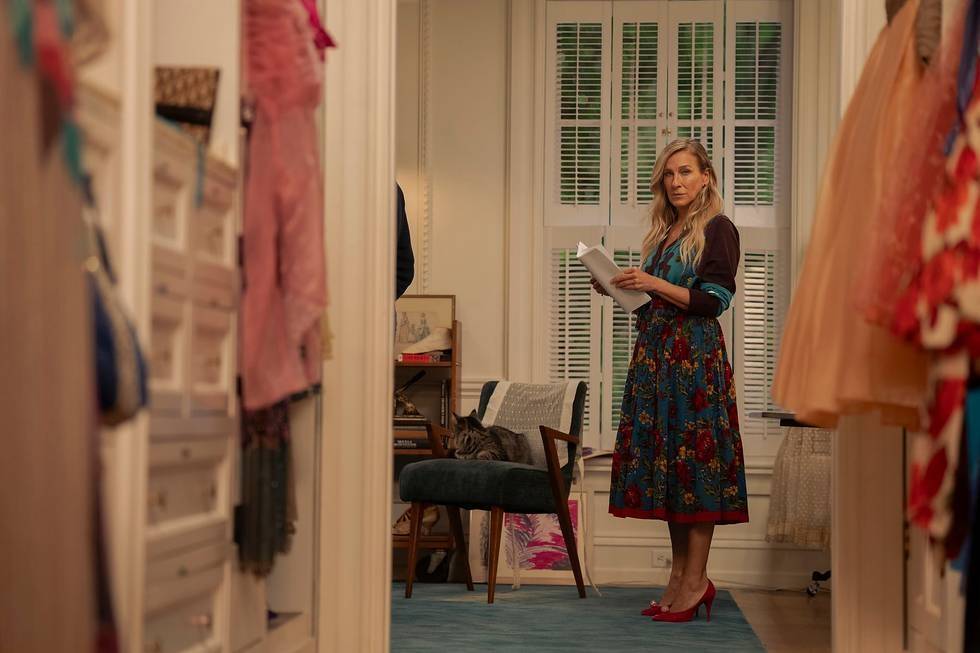‘Sex and the City’ sequel never really found its footing

And just like that, it was over.
“And Just Like That …,” the glossy and sporadically baffling “Sex and the City” sequel helmed by Michael Patrick King and Sarah Jessica Parker, will end with a two-part finale Thursday. The announcement of nonrenewal was abrupt.
“It became clear to me that this might be a wonderful place to stop,” executive producer King said in a statement on Instagram, adding that while the decision to end the series had been made some time ago, he and series star and executive producer Parker “didn’t want the word ‘final’ to overshadow the fun of watching the season.”
The reboot, which covered the 50-something misadventures of Carrie (Parker), Miranda (Cynthia Nixon) and Charlotte (Kristin Davis), has been a mixed bag from the start. The series opened in 2021 with Carrie happily married to her old flame Big (Chris Noth) but swiftly dispatched him (via a Peloton-induced heart attack) to give Carrie — whose bubbly anxiety and merry demeanor formed the backbone of the series — a long but meandering storyline about navigating widowhood.
An effort to modernize and atone for past omissions led the writers to flood the first season with too many storylines and new characters, most of them non-white, queer and oddly underwritten. And a potentially fascinating one about Miranda discovering her sexuality (she comes out as a lesbian in the reboot) was so oddly paced — and awkwardly written — that it dealt substantial damage to the character’s longtime love story with Steve (David Eigenberg), a bar owner and businessman whom the reboot retconned as so incompetent he gets lost in a farmers market.
Still, “Sex and the City,” which ran from 1998 to 2004, was a revolutionary, frank, touching and explicit exploration of female friendship, sexual politics, and single life in New York City. It featured conversations about sex and intimacy no one else really had — on TV, anyway.
There was enough residual fondness and nostalgia to fuel viewership of the sequel, at least at first. King and Parker had a beloved universe to build on, and fans were game to let the show find its footing, even without Samantha (Kim Cattrall), the raunchiest and oldest of the foursome. (Cattrall’s refusal to participate in the series made headlines, and she did eventually agree to a brief cameo, for which she reportedly received around $1 million). What would the girls’ lunches, and nights on the town, look like now that they were older, and dealing with families and aging and loss?
The show’s answer has been: They hang out together less. A lot less. And while some new characters have hit their stride, the show has suffered from a lack of cohesion. One factor was the choice to cut the original series’ other major structuring principle — Carrie’s column, in which she processed her choices and dilemmas via voice-over. Those reflections usually tied each “Sex and the City” episode (and various subplots) together.
In their absence, the new series has felt unfocused. And the new series’ protagonist — and the character we’ve historically had most access to — has been a mute cipher for much of the new show’s run.
The old Carrie talked a lot; genial oversharing was the point of her column. This version of Carrie doesn’t share what she’s thinking or feeling even with her closest friends.
Or with viewers. Carrie shut audiences out, too. Not even her historical novel, which could easily have been a proxy for the character to think through some of her questions or reservations about Aidan, delivered anything revealing, or interesting, about the relationship.
Quite the opposite, in fact: A recent storyline in which she finally reunites with Aidan (John Corbett), a major love interest from the original series, had Carrie working so hard to defend their obscure five-year arrangement from perceived judgment that she bristled at Miranda’s suggestion that she seemed to be vibing with Duncan (Jonathan Cake), a fellow writer. As a result, the Aidan storyline ended without Carrie ever really processing the issues, or her own feelings, with her friends.
It isn’t hard to understand why Carrie might be less garrulous in widowhood, and perhaps the two-part finale will address all the ways the character has evolved. But it would have been rewarding to witness her grapple in a sustained way with her own transformation.
This is an excerpt from a Washington Post story.